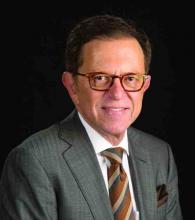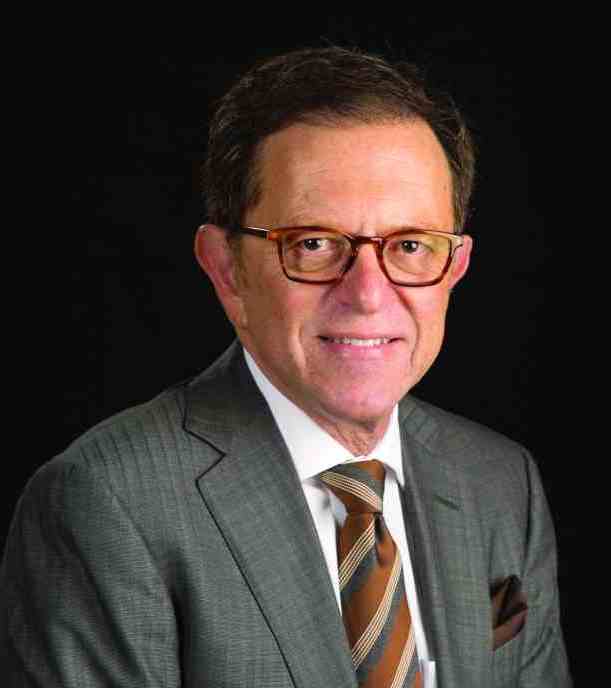User login
Medical treatment of vascular disease is the topic of the Wednesday morning session, “Medical Treatments; Lipid Management By Drugs; Heart And Coronary Stent Related Topics.”
The session will be co-moderated by Dr. Karthikeshwar Kasirajan of Alamo, Calif., who will also be presenting on “Value and Limitations of Cannabis (Marijuana) in Vascular Patients: What is the Drug’s Effect on Blood Vessels.” The topic of cannabis is pertinent, Dr. Samson noted, because “marijuana is now becoming widely used both for medical and recreational use and so an awareness of its possible side effects is essential.”
Cardiac risk for for vascular surgery patients will be the focus of two presentations. Dr. Ashraf Mansour of Michigan State University will present “How Does a Cardiology Evaluation Before Major Vascular Surgery Decrease Perioperative Myocardial Infarction Rates” and Dr. Mohammad H. Eslami of the University of Pittsburgh School of Medicine will discuss including a frailty assessment in the preoperative risk assessment prior to vascular surgery.
“Naturally, cardiac issues also impact practices. There is still considerable variation in how vascular surgeons evaluate cardiac risk prior to major vascular surgery. Dr. Mansour will inform us as to whether any evaluation is actually beneficial,” Dr. Samson added.
Another topic of interest will be the implications of anti-clotting medications for vascular surgery patients. Dr. Samson said, “An especially difficult and controversial area is the management of vascular patients who have been placed on an antiplatelet agent by their cardiologist. For example, many patients will have had a drug-eluting coronary stent inserted with or without antiplatelet agents.” Dr. Caron B. Rockman of New York University School of Medicine will address the guidelines “as to when and if, vascular surgery can be safely performed in such patients,” said Dr. Samson. His talk is titled “Update on When If Ever After a Coronary BMS or DES Can Vascular Surgery Be Safely Performed and How Should Antiplatelet Drugs Be Managed Perioperatively in Coronary Stent Patients.”
Finally, there will be several discussions and two debates addressing the use and value of statins, diet, PCSK-9 inhibitors, lipid level goals, and the safety of statins in vascular patients. Dr. Jeffrey S. Berger, also of New York University School of Medicine, will address the importance of the LDL-cholesterol decreases and what to do for patients who are intolerant of statins. Dr. Peter Henke of the University of Michigan will discuss the impact of PCSK-9 inhibitors, statins, ezetimibe, and diet on LDL cholesterol levels.
Dr. Samson noted, “Recently, data have become available demonstrating profound benefits of LDL lowering especially with some of the new PCSK-9 inhibitor drugs. During the session, information about these drugs and their use will be presented. Currently, they have not been widely adopted because of price concerns, but vascular surgeons should be informed about the potential impact these medications may have on their future practice. Further, although statins have been around for many years, there actual benefit in patients with established peripheral artery disease remains somewhat controversial and, accordingly, is the focus of one of the debates.” The first debate, moderated by Dr. Ron Waksman of Georgetown University Medical Center will focus on the safety and longevity impacts of lower LDL-cholesterol levels with statins and PCSK-9 inhibitors in vascular patients. A second debate, moderated by Dr. Sherif A. H. Sultan of the National University of Irealand, Galway, will dig deeper into the safety and efficacy of statins.
Session 31:
Medical Treatments; Lipid Management by Drugs; Heart and Coronary Stent Related Topics
6:40 a.m – 7:48 p.m.
Grand Ballroom West, 3rd Floor
Medical treatment of vascular disease is the topic of the Wednesday morning session, “Medical Treatments; Lipid Management By Drugs; Heart And Coronary Stent Related Topics.”
The session will be co-moderated by Dr. Karthikeshwar Kasirajan of Alamo, Calif., who will also be presenting on “Value and Limitations of Cannabis (Marijuana) in Vascular Patients: What is the Drug’s Effect on Blood Vessels.” The topic of cannabis is pertinent, Dr. Samson noted, because “marijuana is now becoming widely used both for medical and recreational use and so an awareness of its possible side effects is essential.”
Cardiac risk for for vascular surgery patients will be the focus of two presentations. Dr. Ashraf Mansour of Michigan State University will present “How Does a Cardiology Evaluation Before Major Vascular Surgery Decrease Perioperative Myocardial Infarction Rates” and Dr. Mohammad H. Eslami of the University of Pittsburgh School of Medicine will discuss including a frailty assessment in the preoperative risk assessment prior to vascular surgery.
“Naturally, cardiac issues also impact practices. There is still considerable variation in how vascular surgeons evaluate cardiac risk prior to major vascular surgery. Dr. Mansour will inform us as to whether any evaluation is actually beneficial,” Dr. Samson added.
Another topic of interest will be the implications of anti-clotting medications for vascular surgery patients. Dr. Samson said, “An especially difficult and controversial area is the management of vascular patients who have been placed on an antiplatelet agent by their cardiologist. For example, many patients will have had a drug-eluting coronary stent inserted with or without antiplatelet agents.” Dr. Caron B. Rockman of New York University School of Medicine will address the guidelines “as to when and if, vascular surgery can be safely performed in such patients,” said Dr. Samson. His talk is titled “Update on When If Ever After a Coronary BMS or DES Can Vascular Surgery Be Safely Performed and How Should Antiplatelet Drugs Be Managed Perioperatively in Coronary Stent Patients.”
Finally, there will be several discussions and two debates addressing the use and value of statins, diet, PCSK-9 inhibitors, lipid level goals, and the safety of statins in vascular patients. Dr. Jeffrey S. Berger, also of New York University School of Medicine, will address the importance of the LDL-cholesterol decreases and what to do for patients who are intolerant of statins. Dr. Peter Henke of the University of Michigan will discuss the impact of PCSK-9 inhibitors, statins, ezetimibe, and diet on LDL cholesterol levels.
Dr. Samson noted, “Recently, data have become available demonstrating profound benefits of LDL lowering especially with some of the new PCSK-9 inhibitor drugs. During the session, information about these drugs and their use will be presented. Currently, they have not been widely adopted because of price concerns, but vascular surgeons should be informed about the potential impact these medications may have on their future practice. Further, although statins have been around for many years, there actual benefit in patients with established peripheral artery disease remains somewhat controversial and, accordingly, is the focus of one of the debates.” The first debate, moderated by Dr. Ron Waksman of Georgetown University Medical Center will focus on the safety and longevity impacts of lower LDL-cholesterol levels with statins and PCSK-9 inhibitors in vascular patients. A second debate, moderated by Dr. Sherif A. H. Sultan of the National University of Irealand, Galway, will dig deeper into the safety and efficacy of statins.
Session 31:
Medical Treatments; Lipid Management by Drugs; Heart and Coronary Stent Related Topics
6:40 a.m – 7:48 p.m.
Grand Ballroom West, 3rd Floor
Medical treatment of vascular disease is the topic of the Wednesday morning session, “Medical Treatments; Lipid Management By Drugs; Heart And Coronary Stent Related Topics.”
The session will be co-moderated by Dr. Karthikeshwar Kasirajan of Alamo, Calif., who will also be presenting on “Value and Limitations of Cannabis (Marijuana) in Vascular Patients: What is the Drug’s Effect on Blood Vessels.” The topic of cannabis is pertinent, Dr. Samson noted, because “marijuana is now becoming widely used both for medical and recreational use and so an awareness of its possible side effects is essential.”
Cardiac risk for for vascular surgery patients will be the focus of two presentations. Dr. Ashraf Mansour of Michigan State University will present “How Does a Cardiology Evaluation Before Major Vascular Surgery Decrease Perioperative Myocardial Infarction Rates” and Dr. Mohammad H. Eslami of the University of Pittsburgh School of Medicine will discuss including a frailty assessment in the preoperative risk assessment prior to vascular surgery.
“Naturally, cardiac issues also impact practices. There is still considerable variation in how vascular surgeons evaluate cardiac risk prior to major vascular surgery. Dr. Mansour will inform us as to whether any evaluation is actually beneficial,” Dr. Samson added.
Another topic of interest will be the implications of anti-clotting medications for vascular surgery patients. Dr. Samson said, “An especially difficult and controversial area is the management of vascular patients who have been placed on an antiplatelet agent by their cardiologist. For example, many patients will have had a drug-eluting coronary stent inserted with or without antiplatelet agents.” Dr. Caron B. Rockman of New York University School of Medicine will address the guidelines “as to when and if, vascular surgery can be safely performed in such patients,” said Dr. Samson. His talk is titled “Update on When If Ever After a Coronary BMS or DES Can Vascular Surgery Be Safely Performed and How Should Antiplatelet Drugs Be Managed Perioperatively in Coronary Stent Patients.”
Finally, there will be several discussions and two debates addressing the use and value of statins, diet, PCSK-9 inhibitors, lipid level goals, and the safety of statins in vascular patients. Dr. Jeffrey S. Berger, also of New York University School of Medicine, will address the importance of the LDL-cholesterol decreases and what to do for patients who are intolerant of statins. Dr. Peter Henke of the University of Michigan will discuss the impact of PCSK-9 inhibitors, statins, ezetimibe, and diet on LDL cholesterol levels.
Dr. Samson noted, “Recently, data have become available demonstrating profound benefits of LDL lowering especially with some of the new PCSK-9 inhibitor drugs. During the session, information about these drugs and their use will be presented. Currently, they have not been widely adopted because of price concerns, but vascular surgeons should be informed about the potential impact these medications may have on their future practice. Further, although statins have been around for many years, there actual benefit in patients with established peripheral artery disease remains somewhat controversial and, accordingly, is the focus of one of the debates.” The first debate, moderated by Dr. Ron Waksman of Georgetown University Medical Center will focus on the safety and longevity impacts of lower LDL-cholesterol levels with statins and PCSK-9 inhibitors in vascular patients. A second debate, moderated by Dr. Sherif A. H. Sultan of the National University of Irealand, Galway, will dig deeper into the safety and efficacy of statins.
Session 31:
Medical Treatments; Lipid Management by Drugs; Heart and Coronary Stent Related Topics
6:40 a.m – 7:48 p.m.
Grand Ballroom West, 3rd Floor

